Fox News Politics Newsletter: ‘FBI’s “Gotcha” Scheme’
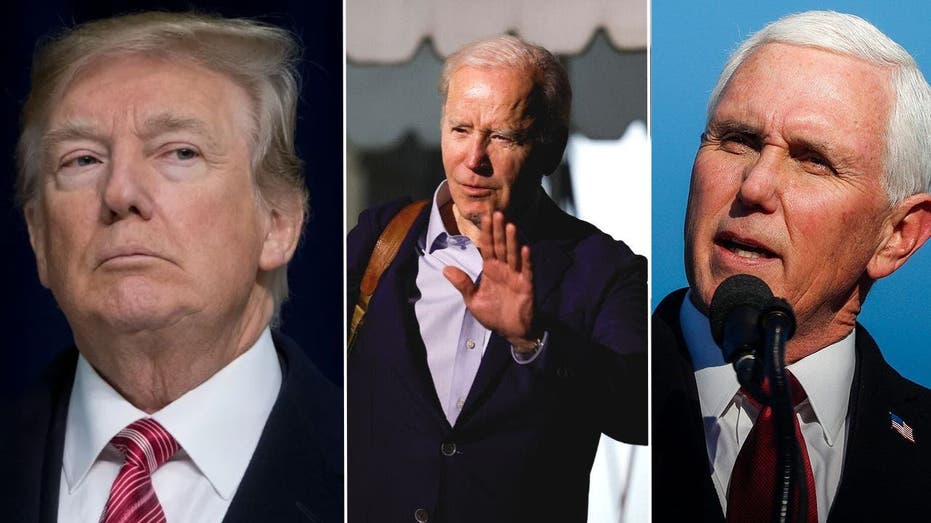
Welcome to the Fox News Politics newsletter, with the latest updates on the Trump administration, Capitol Hill and more Fox News politics content. Here’s what’s happening… –Education Department launches widespread civil rights probe: A look at what the agency does as Trump eyes shutdown -50 House Dems railed for ‘political puppet show’ after making identical social media posts –Migrant gangs on notice after string of home burglaries EXCLUSIVE: The Biden White House turned over government cellphones belonging to President Donald Trump and former Vice President Mike Pence to the FBI in May 2022 as part of a bureau probe into the aftermath of the 2020 election, tying Trump to that investigation without sufficient predication, Fox News Digital has learned. The FBI did not need a warrant to physically obtain the government phones from the Biden White House, but after acquiring the devices agents began drafting a search warrant to extract the phones’ data, sources familiar with the investigation told Fox News Digital. “The Biden White House played right along with the FBI’s ‘gotcha’ scheme against Trump,” a source familiar with the investigation told Fox News Digital. “Biden’s Office of White House Counsel, under the leadership of Dana Remus and Jonathan Su, gave its blessing and accommodation for the FBI to physically obtain Trump and Pence’s phones in early May 2022. Weeks later, the FBI began drafting a search warrant to extract the phones’ data.” …Read more TAKEN FOR A SPIN: Biden also paraded electric vehicles at the White House, when he drove a Jeep Wrangler in 2021 ‘VACCINE HESITANCY’: Millions spent by Biden on COVID ‘vaccine hesitancy’ campaign slashed by Trump NIH: report SPLIT ON TRUMP: Americans split over the job Trump and Musk are doing: poll ‘DEPARTMENT OF INJUSTICE’: Trump accuses Biden’s DOJ of trying to turn U.S. into ‘corrupt communist’ country ‘BROKE THE DEADLOCK’: ‘We have never been this close to peace’ since Russia invaded Ukraine, Leavitt tells reporters ‘REALLY STAGGERING’: Trump praised for getting NATO allies to bolster defense spending ‘PLEASED TO ANNOUNCE’: Venezuela agrees to resume deportation flights SENATE GRILLING: Dr. Oz faces Senate grilling on Capitol Hill in bid to run Centers for Medicare and Medicaid BAD EVIDENCE: Anna Paulina Luna escalates DOJ standoff over Epstein docs, unveils SHRED Act ‘WELLNESS GRIFTING’: Oz bats back Dem attempts to paint him as ‘snake oil’ salesman KEY WITNESS: Key witness in American college student’s disappearance tells police how they met, what happened on beach ‘ENDS NOW’: Tulsi Gabbard lists ‘recent examples of unauthorized leaks’ from intelligence community, announces crackdown ‘RADICALS’: Vance booed at Kennedy Center concert ‘BROKEN BUSINESS MODEL’: USPS signs agreement with DOGE after moving to cut 10,000 workers: ‘Broken business model’ Get the latest updates on the Trump administration and Congress, exclusive interviews and more on FoxNews.com.
Trump pledges to make US capital ‘crime-free’ and the ‘talk of the world’
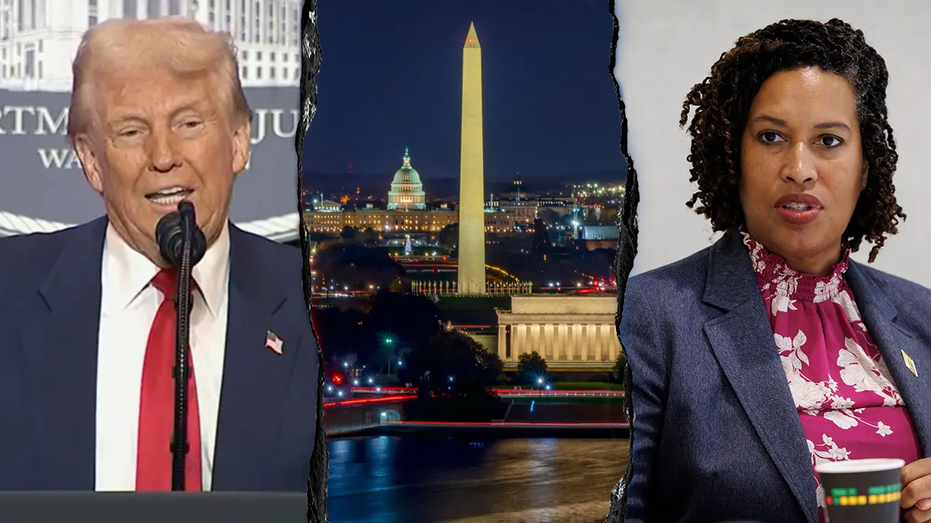
President Donald Trump renewed his vow to clean up the city of Washington, D.C., Friday while speaking at the Department of Justice, saying, “We’re going to have a crime-free capital.” “We’re cleaning up our city. We’re cleaning up this great capital,” the president said. “And we’re not going to have crime, and we’re not going to stand for crime.” He noted that, since returning to the White House, he has had to order the roadways cleaned of tents and graffiti when heads of state visit. TRUMP BLASTS BIDEN’S DOJ: THEY TRIED TO TURN US INTO A ‘CORRUPT COMMUNIST’ THIRD WORLD COUNTRY “When Prime Minister Modi of India, when the president of France and all of these people, the prime minister of the United Kingdom, they all came to see me over the last week and a half. And, when they come in, I had the route run,” he said. “I didn’t want to have them see tents. I didn’t want to have them see graffiti. I didn’t want to have them see broken barriers and potholes in the roads. “We want to have a capital that can be the talk of the world,” Trump added. “We’re going to do that for the city.” Trump commended D.C. Mayor Muriel Bowser, a Democrat, for cooperating with his administration. DANCING TRANSGENDER HECKLERS SHUT DOWN PARENTS’ EVENT AT BLUE STATE’S CAPITOL: ‘SAD AND UNFORTUNATE’ Bowser recently announced the removal of a “Black Lives Matter” street mural that was installed in front of the White House in 2020. “We’re working with the administration, and if the administration can’t do the job, we’re going to have to take it back and run it through the federal government,” said Trump. “But we hope the administration’s going to be able. So far, so good. So far, they’ve been doing very well. The mayor has been doing a good job.” “We’re going to have a crime-free capital,” he added. “When people come here, they’re not going to be mugged or shot or raped. They’re going to have a crime-free capital again. It’s going to be cleaner and better and safer than it ever was. And it’s not going to take us too long.”
Paxton says trans Texans can’t use court orders to change sex on driver’s licenses, birth certificates
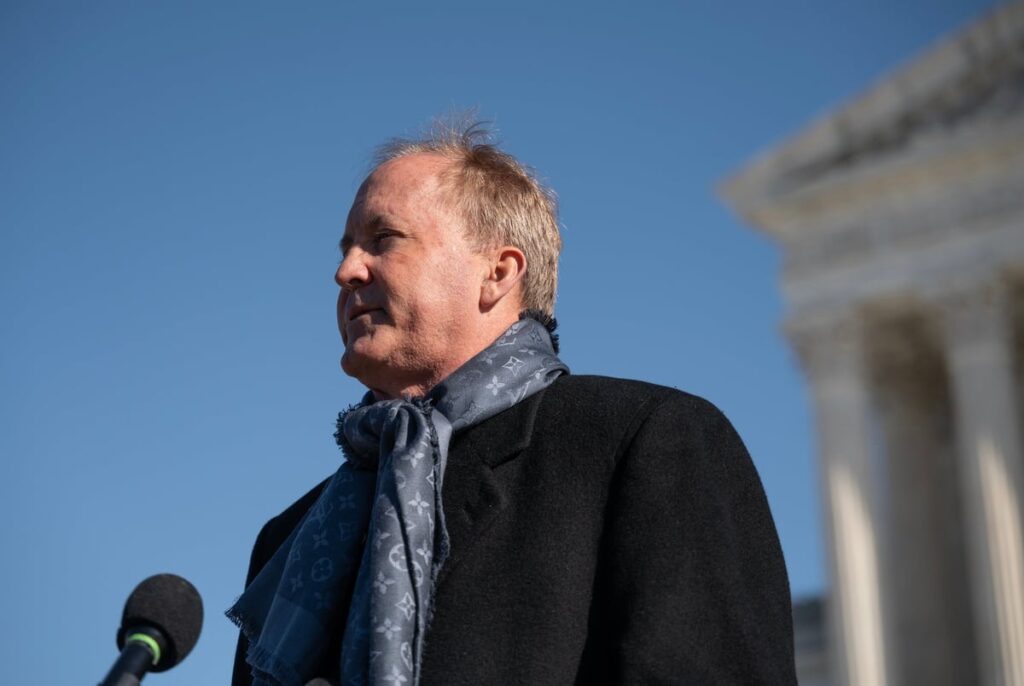
Per the attorney general’s nonbinding opinion, state agencies should change gender markers on government documents back to a person’s sex assigned at birth.
AOC, Sanders tell supporters to mask up for West Coast town halls
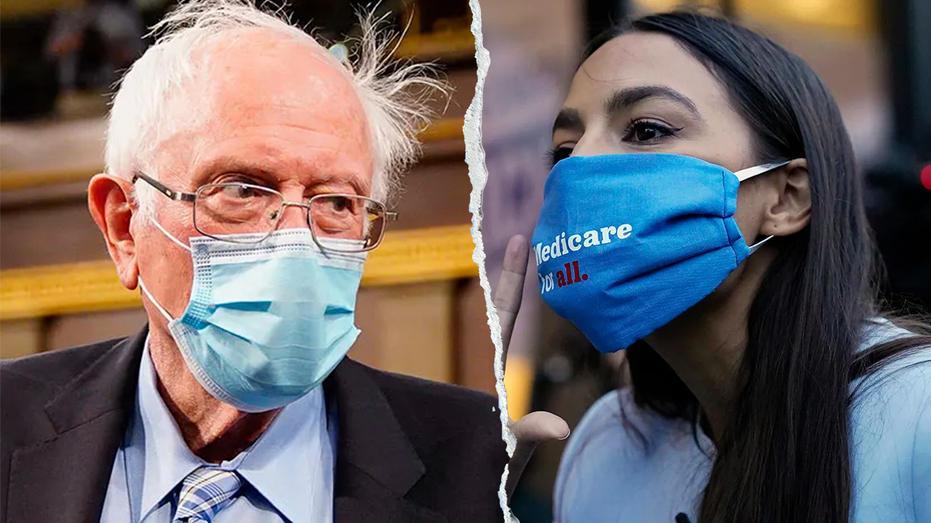
Sen. Bernie Sanders, I-Vt., and Rep. Alexandria Ocasio-Cortez, D-N.Y., are taking the “Fighting Oligarchy” rallies out West next week – and advising supporters to mask up to participate. Five years after the COVID-19 pandemic, Fox News Digital can confirm that the RSVP for the events in Denver and Las Vegas includes guidance that “masks are advised for all attendees of this event.” A post shared by conservative podcaster Stephen L. Miller on Friday about the Denver event had many wondering why masks would be advised for an outdoor event in 2025. Sanders did not immediately respond to Fox News Digital’s inquiry about the mask guidance. DEM LEADER SWINGS THROUGH GOP-HELD DISTRICTS AFTER ‘CLOWN SHOW PROTESTS’ HALTED TOWN HALLS “Sent from a friend. Bernie’s speaking tour is advising everyone in attendance to wear masks. This is an outdoor event,” the X post said, accompanied by a screenshot of the RSVP. ‘HE CANNOT BUY AN ELECTION HERE IN WISCONSIN’: SANDERS SLAMS MUSK IN STATE TRUMP WON BY LESS THAN 1% “Still trying the Covid panic politics,” the top comment said. “Was this from the year 2020?” a content creator asked. But another reply countered: “They don’t want the paid attendees found out.” The reactions to the post are split, with many people online dumbfounded by the need for masks exactly five years after the COVID-19 pandemic forced shutdowns and social distancing. Others speculated that the masks are a way to protect attendees’ identities. Masks are a common practice to protect protesters’ identities at large demonstrations, like the pro-Palestine protests at Columbia University this past year. However, Sanders’ “Fighting Oligarchy” events are not protests. Events in the Blue Wall states of Michigan and Wisconsin last weekend operated like a traditional campaign rally, with thousands of supporters lining up to earn a spot inside to hear the headline speaker. Sanders announced the West Coast leg of his “Fighting Oligarchy” tour with Ocasio-Cortez in a social media video on Friday. The progressives will make stops in Nevada, Arizona and Colorado “to hold town meetings with working people who are profoundly disgusted with what is going on in Washington, D.C.” “Nevada, Colorado, Arizona: You deserve public servants who show up for you. The time is now to protect the public good, advance healthcare and living wages for all, and fight against corruption. See you next week,” Ocasio-Cortez said on Friday. The National Republican Congressional Committee (NRCC), the political campaign committee tasked with electing more Republicans to the U.S. House of Representatives, advised against town halls following a series of protest disruptions fueled by Democrats’ discontent with President Donald Trump’s second term. Gov. Tim Walz, D-Minn., began his own slew of town hall events in Republican-held congressional districts on Friday, saying if a Republican representative refused to meet with their constituents, then he would “lend a megaphone” to them. The Democratic National Committee (DNC) announced on Friday a revised organized effort alongside the Democratic Congressional Campaign Committee (DCCC), Association of State Democratic Committees (ASDC) and Democrat state parties to host town halls in Republican-held districts. “Republicans in Congress know they sold out their voters by backing the Trump-Musk agenda – and now they’re terrified to be in the same room as the people who sent them to Washington,” DNC Chair Ken Martin said in a statement on Friday. “Instead of facing their constituents, they’re running scared and hiding from the people they were elected to represent. If they won’t talk to their own voters, then Democrats will. That’s why we’ll be hosting People’s Town Halls in all 50 states across the country, starting now with vulnerable GOP-held target districts. Working families deserve to have their voices heard, even if Republicans want to ignore them,” Martin added. The NRCC said the protests that shut down Republicans’ town hall meetings were “manufactured productions.” Fox News Digital reported last month about the coordinated effort by progressive groups protesting the Department of Government Efficiency. MEET THE FAR-LEFT GROUPS FUNDING ANTI-DOGE PROTESTS AT GOP OFFICES ACROSS THE COUNTRY MoveOn.org, which has accepted millions of dollars from billionaire George Soros and his Open Society Policy Center, announced in a press release last month that it was mobilizing resources as part of a “Congress Works for Us, Not Musk” initiative “aimed at pressuring lawmakers to fight back against the Trump-Musk agenda” at Republican town halls and offices. Speaker of the House Mike Johnson and Trump called the protesters who shut down Republican town halls “professionals” and “paid troublemakers.” “Paid ‘troublemakers’ are attending Republican Town Hall Meetings. It is all part of the game for the Democrats, but just like our big LANDSLIDE ELECTION, it’s not going to work for them!” Trump wrote on Truth Social. In addition to the mask guidance, the flier for next Friday’s event with Sanders and Ocasio-Cortez includes typical safety precautions for large public events, including a request for anyone not feeling well to stay home. “Please note: no bags, signs, or firearms are allowed. Masks are advised for all attendees of this event. Anyone experiencing a fever or other symptoms of COVID-19 is asked to stay home and not attend,” it says on the RSVP. The Center for Disease Control and Prevention (CDC) ended their travel mask mandate on April 18, 2022. According to the CDC’s website, masks are still “recommended in indoor public transportation settings” and “people may choose to mask at any time.” The website advises people who are at medium to high risk of getting very sick to wear a mask or “consider avoiding non-essential indoor activities in public where you could be exposed.” While the CDC has maintained that masking can reduce the spread of respiratory illnesses, including COVID-19, other studies since the pandemic have brought into question the efficacy of wearing a mask.
New Canadian PM blasts Trump’s 51st state idea: ‘Crazy’
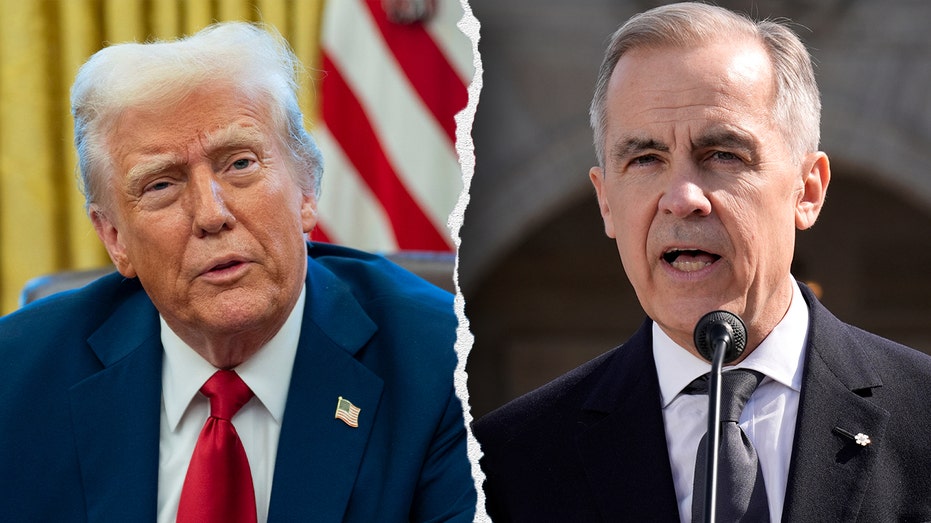
Newly minted Canadian Prime Minister Mark Carney has defiantly rejected any notion that Canada will become America’s 51st state amid tensions about an all-out trade war between the neighboring nations. Carney, speaking to reporters after being sworn into office on Friday, shot down the bold and controversial idea touted by President Donald Trump, calling the idea “crazy.” “We will never, ever in any way, shape or form, be part of the United States,” Carney said. He said that Canada is sovereign with its own values and traditions and that Trump needs to show the nation more respect. Asked about Secretary of State Marco Rubio, who told reporters that Trump’s position is that Canada would be better off joining the United States, Carney said Rubio’s point was crazy. “It’s crazy,” Carney said. “His point is crazy. That’s it.” Trump has said that annexing Canada would prevent the country from being on the receiving end of punishing trade tariffs. Trump claims the U.S. has subsidized Canada to the tune of $200 billion annually and the U.S. began imposing a 25% tariff on goods from Canada and Mexico last week. Two days later Trump suspended the 25% tariffs on most goods from Canada and Mexico covered under the U.S.-Mexico-Canada Agreement (USMCA) for one month. Trump has put 25% tariffs on Canada’s steel and aluminum and is threatening sweeping tariffs on all Canadian products on April 2. Trump has long said Canada — as well as Mexico — has also failed to do enough to prevent the flow of illegal migrants and drugs, particularly fentanyl into the U.S. Carney said he has no immediate plans to meet with President Trump but looks forward to doing so. He also addressed Trump’s concerns with Canada. “We respect President Trump,” Carney said. “President Trump has put some very important issues at the top of his agenda. To understand his agenda is understand the importance of addressing the scourge of fentanyl, which is a challenge here in Canada as well as the United States. “And I would say that the measures that have been put in place in recent weeks in Canada and Mexico, also the United States, means that we are making tremendous progress.” Carney noted he understands the importance President Trump places on American workers and American jobs. “And we want him and his administration to understand the importance we put on Canadian workers and Canadian job,” Carney said. “And we will look for avenues to work together so that both objectives are met in terms of our goals, our great economies, just as we are doing. Trump brought up the merger idea to former Canadian Prime Minister Justin Trudeau in person when the pair met at Mar-a-Lago in late November, per Fox News sources. Trump has also suggested annexing Greenland. Carney, a former Goldman Sachs executive, worked for 13 years in London, Tokyo, New York and Toronto, before being appointed deputy governor of the Bank of Canada in 2003. Carney ran the Bank of Canada from 2008 to 2013 and the Bank of England from 2013 to 2020. He has never been elected to public office by the Canadian electorate and does not have a seat in parliament. He won the Liberal leadership last week with 86% of the vote after Trudeau stood down.
Spending bill to avert shutdown successfully beats filibuster with hours until deadline
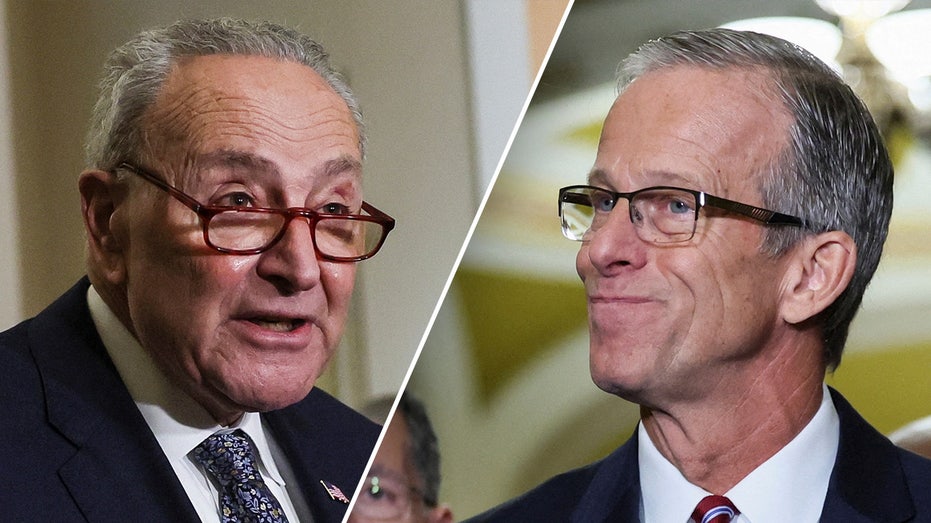
Senators voted to advance the House-passed stopgap spending bill on Friday as the deadline for a government shutdown inches closer. The House-passed short-term spending bill, known as a continuing resolution (CR), would keep spending levels the same as fiscal year (FY) 2024 until Oct. 1. However, if a spending bill is not passed by 11:59 p.m. on Friday, the government will enter into a partial shutdown. Democrats in the Senate were embroiled in passionate disagreement this week over what to do when the measure eventually came for the key procedural vote. In order to reach the 60-vote threshold, Republicans needed some Democratic support, as the GOP majority is only 53 seats and Sen. Rand Paul, R-Ky., planned to vote against it. CHUCK SCHUMER WILL VOTE TO KEEP GOVERNMENT OPEN: ‘FOR DONALD TRUMP, A SHUTDOWN WOULD BE A GIFT’ Amid tense caucus meetings leading up to the vote, Democrats were tight-lipped, unwilling to reveal details about the discussions. During one meeting on Thursday, a senator yelled so loudly that the press could hear through thick, heavy wooden meeting room doors. The voice was identified by the press as that of Sen. Kirsten Gillibrand, D-N.Y., but her office would not confirm. Several Democratic senators came out against the stopgap bill ahead of the procedural hurdle, sharing that they wouldn’t vote to advance it or vote for its passage. However, they faced criticism from staunch government shutdown opponent Sen. John Fetterman, D-Pa., who joked about their “spicy” social media videos about voting no. DEM HEARD SCREAMING AT COLLEAGUES DESPITE SCHUMER’S UNITY CLAIM AS SHUTDOWN LOOMS “It wasn’t that long ago before we were lecturing that you can never shut the government down. So, that’s kind of inconsistent,” he told reporters on Thursday. “We can all agree that it’s not a great CR, but that’s where we are, and that’s the choice,” he emphasized. Senate Minority Leader Chuck Schumer, D-N.Y., had initially claimed on Wednesday that his caucus was unified, and pushed for an alternative CR that would last only a month. But the Republicans did not budge on the House-passed bill that lasts the rest of the fiscal year. SENATE REPUBLICANS COIN ‘SCHUMER SHUTDOWN’ AHEAD OF CRITICAL VOTE ON TRUMP SPENDING BILL By Thursday night, Schumer revealed he would vote to advance and pass the stopgap bill, rather than providing President Donald Trump and Elon Musk with the “gift” of a government shutdown. This was met with significant frustration from Democrats across the country and division about what party leaders should do in such circumstances. CANADA EXPLOITING ‘LOOPHOLE’ HURTING US DAIRY FARMERS AMID TRUMP TARIFFS, SENATORS SAY House Democratic leaders released a late-night statement reiterating their opposition to the CR on Thursday, and Speaker Emerita Nancy Pelosi, D-Calif., shared her own on Friday, similarly slamming the bill. The former speaker called on Democratic senators to “listen to the women” and move forward with “a four-week funding extension to keep government open and negotiate a bipartisan agreement.”
Top House Democrat leaves Schumer in the cold amid left’s disarray on shutdown drama
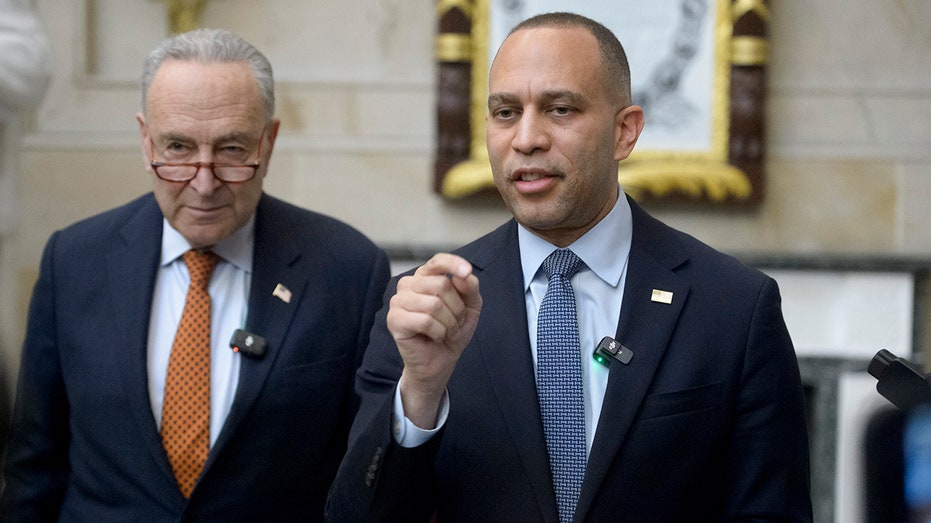
House Minority Leader Hakeem Jeffries, D-N.Y., sidestepped questions on whether he had confidence in Senate Majority Leader Chuck Schumer, D-N.Y., on Friday. The top House Democrat was directly asked about Schumer twice during a hastily-announced press conference to emphasize their opposition to Republicans’ government funding bill. Early during the press conference, Jeffries was asked if it was time for new leadership in the Senate, to which he replied, “Next question.” Jeffries gave the same exact answer when asked later if he had “lost confidence” in Schumer. DEMOCRATS FACE PRESSURE TO ACT AND AVOID A GOVERNMENT SHUTDOWN Many say it’s a major public rift between the top two Democrats in Congress. Jeffries’ silence on his fellow New York liberal comes as other Democratic lawmakers aim their fury at Schumer for announcing he will vote with Republicans to avert a partial government shutdown. Jeffries later emphatically pushed back when Fox News questioned whether he was “afraid to say anything about Schumer.” “Do not characterize my remarks. I’m not afraid about anything,” Jeffries said. When pressed again, he said, “Do you think that this is what the American people care about right now? Or do they want us to do everything that we can to stop this partisan and harmful Republican bill from actually becoming law? Because that’s what we as House Democrats are focused on right now.” DEMOCRATS BLAST SEN. CHUCK SCHUMER FOR BACKING GOP SPENDING BILL Jeffries avoided mentioning Schumer during his press conference, but reporters pressed him with questions about the growing rift between him and the senior Democrat. He did not directly answer when asked if Schumer “acquiesced” to President Donald Trump, only pointing out the vote had not yet taken place. “That’s a question that is best addressed by the Senate. The vote hasn’t taken place yet, and the House Democratic position is very clear. We strongly oppose any efforts to cut the healthcare of the American people, veterans benefits and nutritional assistance, all of which are in the partisan Republican bill,” Jeffries said. Democrats are in historic levels of disarray over a Republican bill to avert a government shutdown that’s been backed by Trump. Progressives have been attacking Schumer for announcing he would not block the bill, but whether Republicans can find enough Democratic support to reach the necessary 60-vote threshold is still unclear. The bill passed the House last week with support from just one House Democrat — Rep. Jared Golden, D-Maine. The House and the Senate must send a bill to Trump’s desk by midnight Friday to avert a partial government shutdown.
Dem senator mocked online for ditching his Tesla to protest ‘a–hole’ Musk: ‘Stunning and brave’
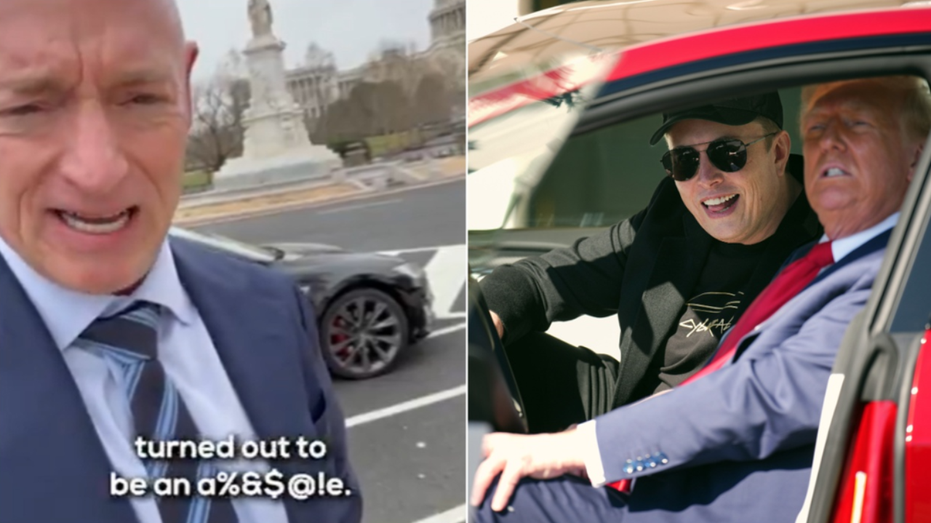
Sen. Mark Kelly, D-Ariz., was mocked by conservatives on social media Friday after he posted a video on X explaining he was getting rid of his Tesla because of the optics brought by Tesla CEO Elon Musk, who Kelly referred to as an “a–hole.” Kelly, a retired astronaut, said he bought a Tesla because it was “fast like a rocket ship” but now it feels like “a rolling billboard for a man dismantling our government and hurting people.” The Arizona senator and military veteran said it’s been difficult driving around in a Tesla knowing the Department of Government Efficiency (DOGE) has cut jobs at the Department of Veterans Affairs. Kelly said today would be his last day driving a Tesla. “When I bought this thing, I didn’t think it was going to become a political issue. Every time I get in this car in the last 60 days or so, it reminds me of just how much damage Elon Musk and Donald Trump are doing to our country,” Kelly said in the video, which was viewed over 1.5 million times just two hours after it was posted. ‘CORRUPTION IN BROAD DAYLIGHT’: DEMS OUTRAGED BY TRUMP ‘PLAYING CAR SALESMAN’ FOR TESLA Kelly added in the video that Elon Musk “kind of turned out to be an a–hole” and that he would rather not drive around in a car “built and designed by an a–hole.” Conservatives on X were quick to mock Kelly’s post. “Literally the most stunning and brave thing a politician has ever done. It’s so brave that I have actually been moved to tears,” White House rapid responder Greg Price said in a post. “There are no more ‘moderate’ Democrats,” conservative influencer account Johnny Maga posted on X in response to Kelly’s video. MARK KELLY ACCUSES TRUMP OF ‘TRYING TO WEAKEN’ UKRAINE, FIRES BACK AT ELON MUSK FOR BRANDING HIM A ‘TRAITOR’ House Majority Speaker Mike Johnson’s director of rapid response posted on X that the video shows “Elon Musk lives rent-free” in Kelly’s head. “‘I bought this product because it’s amazing and I’m only getting rid of it because I don’t like the guy who made it’ is an amazing commercial for Tesla,” conservative commentator Kate Hyde posted on X. “This is just embarrassing,” Republican strategist Nathan Sproul posted on X. Conservative podcaster Stephen L. Miller called out the Democrats’ shift from embracing EVs to “getting rid of theirs in like 3 months.” Fox News Digital reached out to Kelly’s office for comment. Protests have erupted at Tesla showrooms across the country and have since escalated to instances of vandalism on Tesla vehicles and charging stations. The demonstrations began as protests against DOGE, which has scrutinized wasteful government spending and reduced the massive federal workforce. President Donald Trump took the driver’s seat of a red Tesla Model S at the White House to support Musk Tuesday, and Tesla’s stock rebounded after facing a steep decline to start the week during the protests. Democrats were quick to criticize Trump on social media for buying a Tesla at the White House. “Earlier today, while hard-working Americans were watching their retirement savings plummet, President Trump was filming a Tesla ad in front of the White House to help Elon Musk’s failing stock. This is a brazen conflict of interest and corruption in broad daylight,” Democrats on the House Committee on Financial Services said. But conservatives called out Democrats for selectively embracing electric vehicles, reminding liberals that former President Joe Biden drove a hybrid Jeep Wrangler 4xe around the White House grounds to promote his EV initiative. Kelly’s post Friday was the latest escalation in an ongoing social media feud with Musk. “Just left Ukraine. What I saw proved to me we can’t give up on the Ukrainian people. Everyone wants this war to end, but any agreement has to protect Ukraine’s security and can’t be a giveaway to Putin,” Kelly posted this week. “You are a traitor,” Musk replied. “Traitor? Elon, if you don’t understand that defending freedom is a basic tenet of what makes America great and keeps us safe, maybe you should leave it to those of us who do,” Kelly fired back. Kelly said in a video posted yesterday he would vote “no” on the continuing resolution bill in the U.S. Senate, calling it a “partisan power grab for Donald Trump and Elon Musk.”
Senate passes HALT Fentanyl Act to permanently classify all fentanyl-related drugs as Schedule I substances
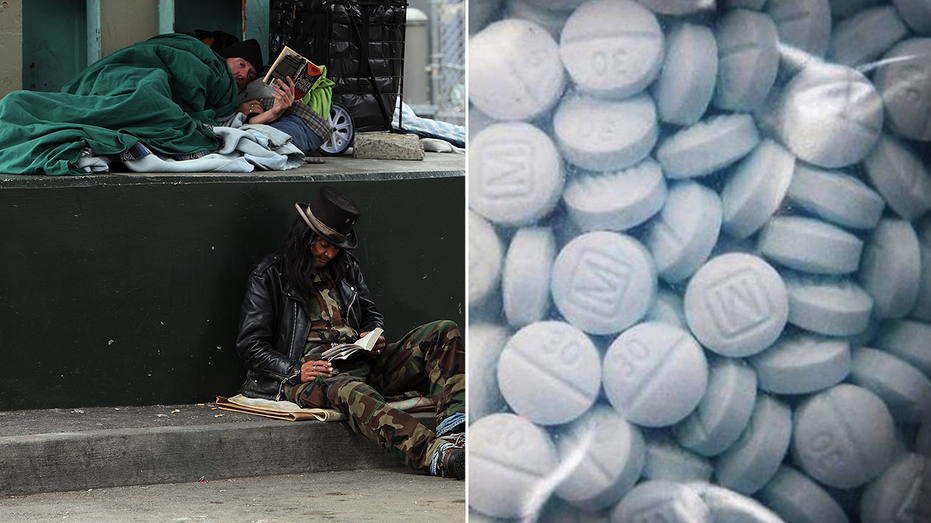
The Senate passed a bipartisan bill Friday that will permanently classify fentanyl-related substances, also known as fentanyl analogs, as Schedule I substances under the Controlled Substances Act. The HALT Fentanyl Act passed with overwhelming support, earning 84 Senate votes while 16 opposed it. The bill aims to close loopholes exploited by drug traffickers who smuggle substances with chemical compositions similar to fentanyl but are different enough to evade legal penalties. “What this bill does — it says, ‘OK, it’s illegal to bring in fentanyl.’ But it recognizes that some of those attempting to bring in fentanyl will try and circumvent the law by changing the fentanyl just enough so that it becomes what is called an analog,” Sen. Bill Cassidy, R-La., the bill’s sponsor and a former physician, told reporters Friday ahead of the bill’s passage. “‘Oh, it’s not fentanyl. You can’t bust me because it’s not actually fentanyl.’ No, it still addicts like fentanyl. It still kills like fentanyl, and it is substantially fentanyl. So, therefore, it shall be treated by law enforcement as if it is fentanyl.” I BLAME BIDEN’S BORDER CRISIS FOR MY TEEN’S FENTANYL DEATH AND THANK TRUMP FOR TRYING TO END THIS SCOURGE Democrats sought to filibuster the bill’s passage, arguing it did not do enough to combat the fentanyl crisis as a whole, would increase mass incarceration and limit the study of these fentanyl analogs by placing them in a more restrictive regulatory category. However, the bill’s Republican sponsors argue it will reduce bureaucratic hurdles in the research of fentanyl analogs, serving to open the door for more scientists to study these novel substances. The arguments it will increase mass incarceration were also questioned by a Stanford University drug policy expert and former White House Office of National Drug Control Policy advisor, Keith Humphreys, who pointed out it’s already illegal to possess or traffic fentanyl analogs. The HALT Fentanyl Act does not create any new mandatory minimum sentencing, but it puts fentanyl-related substances under the same sentencing guidelines used for fentanyl itself. GRIEVING PARENTS SLAM DEMS FOR OPPOSING BIPARTISAN FENTANYL BILL USING CLAIMS PARROTED BY SOROS-BACKED GROUP During a press call Friday with some of the bill’s Republican sponsors ahead of the HALT Act’s passage, Sen. James Lankford, R-Okla., noted how the nature of the U.S. drug crisis is “changing rapidly on the street, and Congress needs to respond.” “This is a major accomplishment, quite frankly, to be able to move this through in the fight against fentanyl,” Lankford added. CLICK HERE TO DOWNLOAD THE FOX NEWS APP Other potential measures to combat the fentanyl crisis, including efforts to bolster law enforcement’s drug interdiction efforts and legislation to go after the veterinary drug xylazine, which is being added to fentanyl to make it more addictive, are among additional efforts being considered on Capitol Hill.
University of North Texas and Rice University under federal investigation for “race-exclusionary practices”
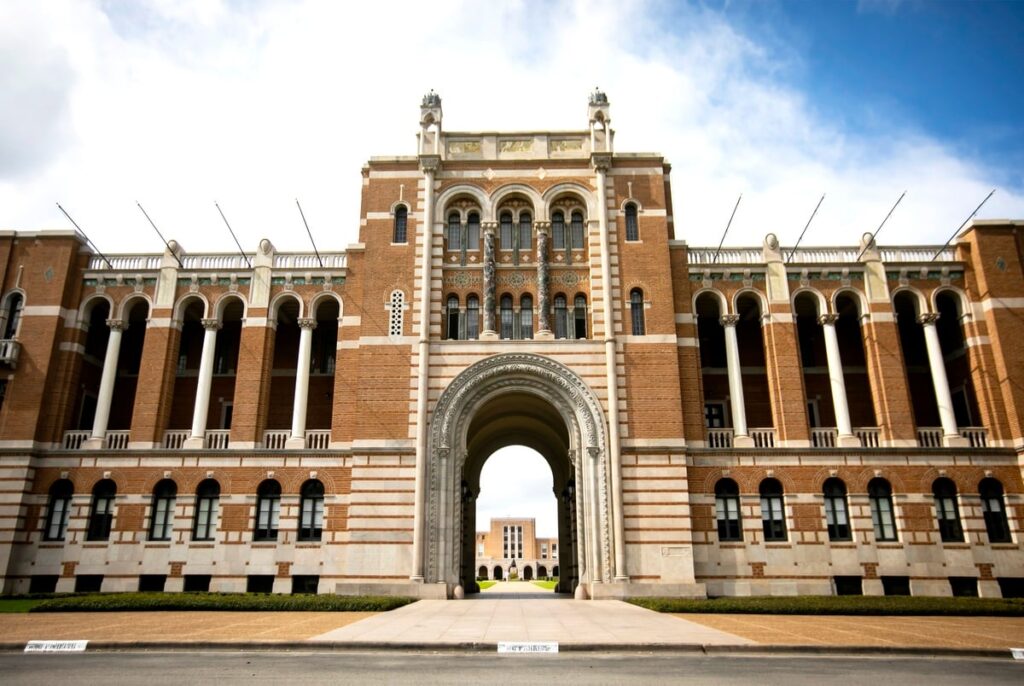
The Texas universities are among dozens accused of violating the law by partnering with a group that had sought to increase diversity in graduate programs.

